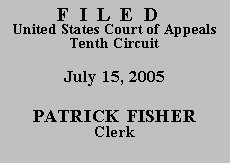 UNITED STATES COURT OF
APPEALS
UNITED STATES COURT OF
APPEALS
 UNITED STATES COURT OF
APPEALS
UNITED STATES COURT OF
APPEALS
TENTH CIRCUIT
|
JEFFRY A. MCCARLEY, RON WARD, Warden, |
Nos. 04-7114 04-7134 (D.C. No. CIV-03-574-P) (E.D. Okla.) |
McCarley was convicted of Assault and Battery with a Deadly Weapon with Intent to Kill, and was sentenced to a total of fifty years' imprisonment. On direct appeal, the Oklahoma Court of Criminal Appeals ("OCCA") affirmed the conviction and sentence on the merits on December 3, 1996, and the 90-day period for appeal to the U.S. Supreme Court expired on March 3, 1997. Thus, the one-year AEDPA statute of limitations ran on March 3, 1998. McCarley filed a petition for a writ of habeas corpus with the U.S. District Court on October 20, 2003. AEDPA provides for a one-year statute of limitations on applications for writs of habeas corpus by persons in custody pursuant to the judgment of a State court. § 2244(d).
The district court dismissed McCarley's habeas petition on the basis of the AEDPA statute of limitations. Because the district court dismissed on a procedural ground prior to development of either the factual or legal basis for his underlying claims, our assessment of the merits of his claims is necessarily limited. "When the district court denies a habeas petition on procedural grounds without reaching the prisoner's underlying constitutional claim, a COA should issue when the prisoner shows, at least, that jurists of reason would find it debatable whether the petition states a valid claim of the denial of a constitutional right and that jurists of reason would find it debatable whether the district court was correct in its procedural ruling." Slack, 529 U.S. at 484 (emphasis added). McCarley has not shown that jurists of reason would find it debatable whether the district court was correct in its procedural ruling.
Because McCarley does not, nor could he, contest that the AEDPA statute of limitations ran before he filed his habeas petition in federal court, he instead argues that we should deem the statute of limitations to have equitably tolled. In support of this proposition, he argues that he suffers from brain damage and that he had inadequate law library facilities. We agree with the district court that he has not demonstrated the "exceptional circumstances," Biester v. Midwest Health Servs., Inc., 77 F.3d 1264, 1268 (10th Cir. 1996), and diligent pursuit of his remedies, see Miller v. Marr, 141 F.3d 976, 978 (10th Cir. 1998), required for equitable tolling.
For the reasons set forth above, McCarley's request for a COA is DENIED
and the appeal is DISMISSED.
ENTERED FOR THE COURT
Carlos F. Lucero
Circuit Judge
*. McCarley's petition was filed after April 24, 1996, the effective date of the Antiterrorism and Effective Death Penalty Act ("AEDPA"); as a result, AEDPA's provisions apply to this case. See Rogers v. Gibson, 173 F.3d 1278, 1282 n.1 (10th Cir. 1999). AEDPA conditions a petitioner's right to appeal a denial of habeas relief under § 2254 upon a grant of a COA. 28 U.S.C. § 2253(c)(1)(A). A COA may be issued "only if the applicant has made a substantial showing of the denial of a constitutional right." § 2253(c)(2). This requires McCarley to demonstrate "that reasonable jurists could debate whether (or, for that matter, agree that) the petition should have been resolved in a different manner or that the issues presented were adequate to deserve encouragement to proceed further." Slack v. McDaniel, 529 U.S. 473, 484 (2000) (quotations omitted). Because the district court denied McCarley a COA, he may not appeal the district court's decision absent a grant of a COA by this court.
2. There are two case numbers on appeal because McCarley filed a second notice after the district court denied his request for a COA. Consequently these appeals constitute a single matter for all practical purposes.